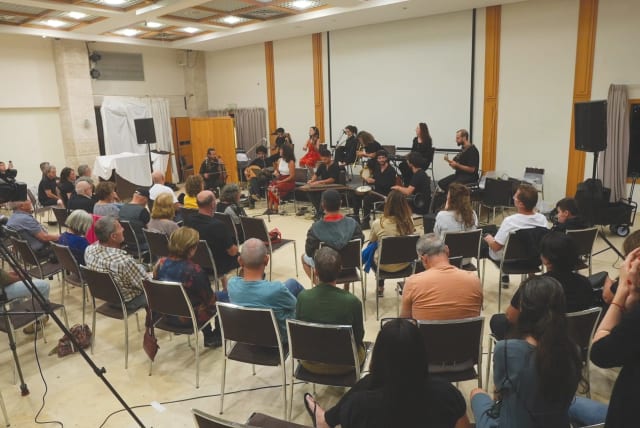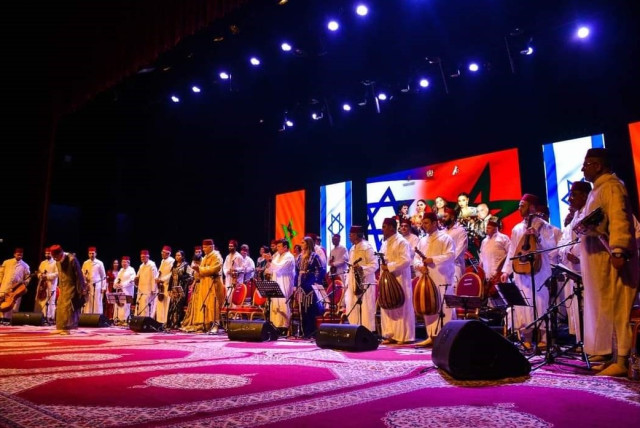Israeli Andalusian Orchestra Ashdod tours the country during wartime

Various members of the ensemble have been traveling the length and breadth of the country, playing – for free – to audiences of all sizes and age groups, and at all kinds of venues, grand and modest.
As the war down South drags on and on, we are settling into some kind of routine and working our everyday activities around the obstacle course of emotion and anxiety, and hopefully keeping the wolves at bay.
We are also, increasingly, coming to the realization that the arts can help to provide some escape from the pain and sadness and boost our flagging spirits. Music is, naturally, at the forefront of these efforts across a wide swath of genres and styles.
The Israeli Andalusian Orchestra Ashdod has been one of the leading contributors to the nationwide effort to provide such much-needed downtime and keep our spirits up. Various members of the ensemble have been traveling the length and breadth of the country, playing – for free – to audiences of all sizes and age groups, and at all kinds of venues, grand and modest alike. “A few days after the Black Shabbat we began to perform at all sorts of places where evacuees were – hotels – or disadvantaged groups at senior citizens’ homes, hospitals, and for soldiers,” says orchestra CEO Shalom Lutati.
The musicians have been hitting the road as often as they possibly can, and in every which direction. “We have played at the hotel at Kfar Maccabiah, Ma’aleh Hahamisha [in the Jerusalem Hills], several hotels in Jerusalem, by the Dead Sea,” Lutati continues. Mind you, the company hasn’t generally been at full strength, for various fully understandable reasons.
“Some of the orchestra members are doing IDF reserve duty right now,” Lutati adds. “It very much depends on who is available, and how many of us the venue in question can accommodate. We generally appear with five to seven musicians. But there are bigger places with bigger halls where we can have 11-14 instrumentalists.” Mileage is also a consideration for the players – distances to the venues and, naturally, fuel costs.
Orchestra is flexible, with some players on reserve duty
That implies a degree of flexibility, and not just in a numerical sense. These special – trying – circumstances call for creative thinking and unconventional modi operandi. This is clearly not a time for the ensemble members to rehearse a scheduled program and then go forth to previously booked auditoria to strut their practiced stuff.
That has been put on a back burner for the foreseeable future, and at a particularly opportune time.
“We should have opened our new season this week,” Lutati notes. “We [normally] perform all over the country, from Kiryat Shmona down to Dimona. Everything was canceled. And we should be marking our 30th anniversary this season.” Lutati and his colleagues had grand ideas for the milestone rollout. “We had planned to bring artists over from Morocco to play with us. And last week we should have taken part in the festival at Essaouira [in Morocco] which is considered the most important festival of Andalusian music.”
In fact, it transpires that Israeli artists are major players in that sector, as indicated by the surprising about-turn the festival organizers were forced into making, following the outbreak of violence here.
“We were due to perform in the opening and closing concerts of the festival. Actually, the whole festival was canceled because there were a lot of Israelis who were due to play there.”
Back on home ground, Lutati says the classical concert scene is not just largely in recess. What is being put out there, at the moment, has taken on a very different configuration and dynamic compared with the usual repertoire selections and presentation format. That might work to everyone’s advantage.
“What we are doing now is a different experience, and a different way of operating,” the CEO explains. “A couple of weeks ago we gave a concert at Ma’aleh Hahamisha, for evacuees from the Gaza envelope. The show normally lasts around an hour. People in the audience wanted to get on the stage and sing songs together with the orchestra. And later there were conversations with them. It went on for two hours or more. That also happened at Kfar Maccabiah, with evacuees from Sderot and Netivot, and last week at the Dead Sea.”
Wartime performances are reaching new audiences
It seems the sounds the orchestra crafts and delivers for the current consumer pool not only appeal to their ears but also their heart.
There may even be some unintentional market benefits to be had too.
“You get all sorts of people coming to our performances now,” says Lutati, “people that wouldn’t normally come.” Presumably, then, might serve to introduce new sectors of the public to Andalusian music in general and, in particular, the ensemble’s offerings.
“They get to see all our authentic instruments in action – the kamancheh (spike violin), the oud and ney (flute) – things they may not be familiar with. We also play Western classical instruments. It’s about half and half. We are getting to new audiences, including young people. There are a lot of teenagers who are suddenly interested and ask questions about what we do. That is wonderful.”
Who knows? Perhaps several years down the road I’ll get to interview a young professional musician, on the eastern side of the musical tracks, who will tell me he first got into Andalusian or Arabic music after attending one of the orchestra’s wartime concerts.
But, of course, the primary objective of the orchestra’s current national circuit is to offer evacuees and others some downtime from the tension and worry, and an hour or so in which can they switch off from the horrors of Hamas brutality, and the ongoing anxiety over the hostages and IDF soldiers on battlefields down south and on standby up north.
Lutati and his cohorts are more than happy to provide the requisite smile-inducing remedial fare, and to tailor their programming to suit the patrons du jour.
“We play songs they know, morale-boosters they are familiar with. We do things like ‘Hallelujah,’ ‘Am Yisrael Hai,’ and ‘Gesher Tzar.’” The original scores may be stock playlist material, but the delivery is probably something of a sonic curve ball for most. “We play those songs based on Andalusian music arrangements,” Lutati smiles. “And there are other popular Hebrew songs.”
With plenty of other gigs lined up for the near future, including at IDF bases, Lutati and any of the orchestra members who happen to be available on the day, have their work cut out for them as they do their best to keep us on an as-even-as-possible spiritual keel.
But with the best will in the world, there are still financial realities to be contended with, mouths to feed, car gas tanks to be filled, and rent or mortgages to be paid. And that’s even without addressing the revenue shortfall with the orchestra’s regular season schedule still on ice.
“In principle, we are supported by the Culture Ministry and the Ashdod Municipality,” Lutati notes. “We are experiencing a very significant drop in income. We are in contact with the Culture Ministry with regard to outlining a plan that will be devised for all the bodies that are to be supported by the state. We hope there will be some kind of compensation. For now, we are covering all our costs ourselves. But this work is very important to us.”
The relevant state bodies, it seems, are experiencing difficulties in getting that together. “We had a couple of Zoom sessions with them, but nothing has happened so far,” Lutati explains. One wonders how long it would take MKs to convene should their latest salary hike be on the table.
For now, at least, some of us carry on finding some solace in the music.
Jerusalem Post Store
`; document.getElementById("linkPremium").innerHTML = cont; var divWithLink = document.getElementById("premium-link"); if (divWithLink !== null && divWithLink !== 'undefined') { divWithLink.style.border = "solid 1px #cb0f3e"; divWithLink.style.textAlign = "center"; divWithLink.style.marginBottom = "15px"; divWithLink.style.marginTop = "15px"; divWithLink.style.width = "100%"; divWithLink.style.backgroundColor = "#122952"; divWithLink.style.color = "#ffffff"; divWithLink.style.lineHeight = "1.5"; } } (function (v, i) { });

